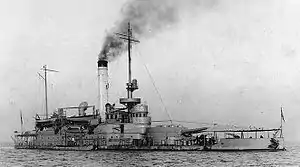Arkansas-class monitor
The Arkansas-class monitors were the last class of four monitors ordered for the U.S. Navy (although the navies of Great Britain and Italy built and used monitors for shore bombardment during World War I and the former used them during World War II as well).
 USS Arkansas (M-7) painted in wartime gray. (She was renamed Ozark in March 1909.) | |
| Class overview | |
|---|---|
| Builders: |
|
| Operators: |
|
| Preceded by: | Monterey-class |
| Built: | 1899–1903 |
| In commission: | 1902–1926 |
| Planned: | 4 |
| Completed: | 4 |
| Retired: | 4 |
| Preserved: | 0 |
| General characteristics | |
| Type: | Monitor |
| Displacement: | |
| Length: | |
| Beam: | 50 ft (15 m) |
| Draft: | 12 ft 6 in (3.81 m) (mean) |
| Installed power: |
|
| Propulsion: |
|
| Speed: | |
| Complement: | 13 officers 209 men |
| Armament: |
|
| Armor: |
|
Design
Single turreted monitors, these ships mounted the most modern heavy guns in the US Navy at the time they were built, 12-inch (305 mm)/40 caliber guns. The Arkansas-class monitors did not see any combat during World War I and instead served as submarine tenders. Alexander C. Brown, writing in the Society of Naval Architects and Marine Engineers Historical Transactions noted in a penetrating comment that:
"Monitors found their final employment as submarine tenders in World War I for which their low freeboard hulls made them well suited. It is significant to note, however, that in this humble capacity they were ministering to the needs of that type of craft which had logically replaced them for as initially envisaged monitors were designed to combine heavy striking power with concealment and the presentation of a negligible target area ..."
They had a displacement of 3,225 long tons (3,277 t; 3,612 short tons), measured 255 feet 1 inch (77.75 m) in overall length, with a beam of 50 feet 1 inch (15.27 m) and a draft of 12 feet 6 inches (3.81 m). They were manned by a total crew of 13 officers and 209 men.[1]
Arkansas' were powered by two vertical triple expansion engines driving two screw propellers with steam generated by four steam boilers. The engines in the Arkansas' were designed to produce 2,400 indicated horsepower (1,800 kW) with a top speed of 12.5 knots (23.2 km/h; 14.4 mph), however, on sea trials only Nevada had top speed over 12.5 knots, 13.04 kn (24.15 km/h; 15.01 mph), the rest came in below. The Arkansas' was designed to provide a range of 2,360 nautical miles (4,370 km; 2,720 mi) at 10 kn (19 km/h; 12 mph).[1]
The ships were armed with a main battery of two 12-inch/40 caliber guns, either Mark 3 or Mark 4, in a Mark 4 turret.[2][3][1] The secondary battery consisted of four 4-inch (100 mm)/50 caliber Mark 7 guns[4] along with three 6-pounder 57 mm (2.2 in) guns. The main belt armor was 11 in (280 mm) in the middle tapering to 5 in (130 mm) at the ends. The gun turrets were between 10 and 9 in (250 and 230 mm), with 11 to 9 in (280 to 230 mm) barbettes. The Arkansas' also had a 1.5 in (38 mm) deck.[1]
Notes
- Citations
Bibliography
Books
- Friedman, Norman (1985). U.S. Battleships: An Illustrated Design History. Annapolis, Maryland: Naval Institute Press. ISBN 978-1-59114-247-8.CS1 maint: ref=harv (link)
Online resources
- DiGiulian, Tony (9 May 2015). "United States of America 12"/40 (30.5 cm) Mark 3 and Mark 4". Navweaps. Retrieved 10 May 2016.
- DiGiulian, Tony (15 June 2015). "United States of America 4"/50 (10.2 cm) Marks 7, 8, 9 and 10". Navweaps. Retrieved 9 July 2016.
- Yarnall, Paul R. (24 June 2016). "M-7 USS ARKANSAS". NavSource. Retrieved 9 July 2016.CS1 maint: ref=harv (link)
External links
- This article incorporates text from the public domain Dictionary of American Naval Fighting Ships. The entry can be found here.
- World Battleships List: US "New Navy" Monitors
- This article incorporates text from the public domain Dictionary of American Naval Fighting Ships. The entry can be found here.